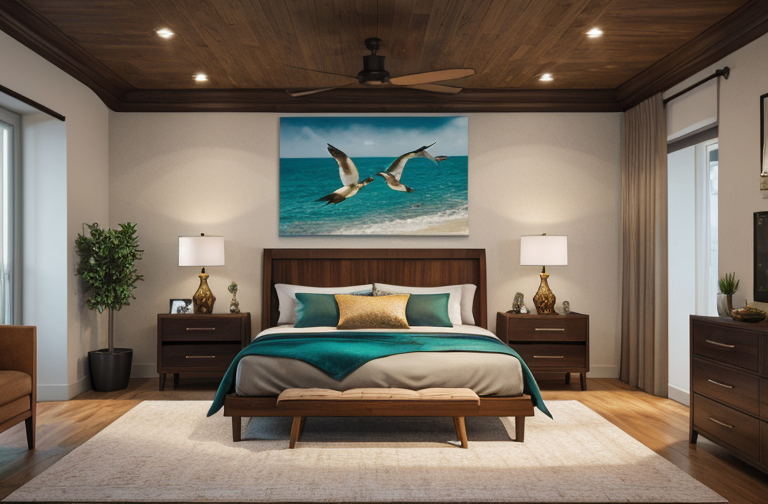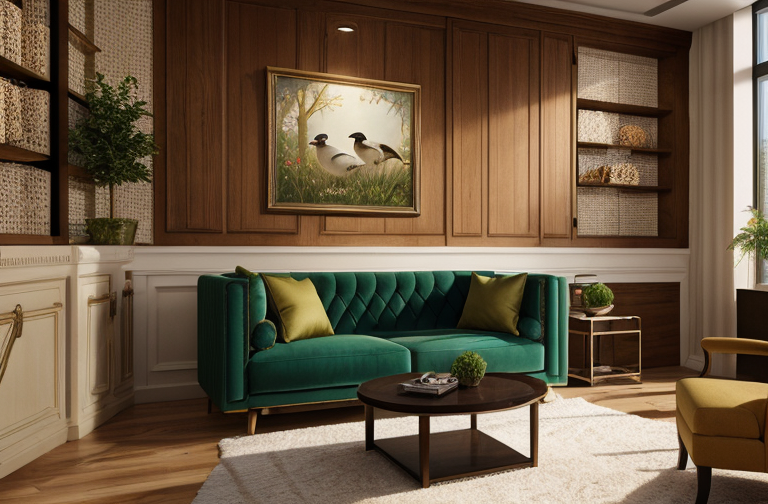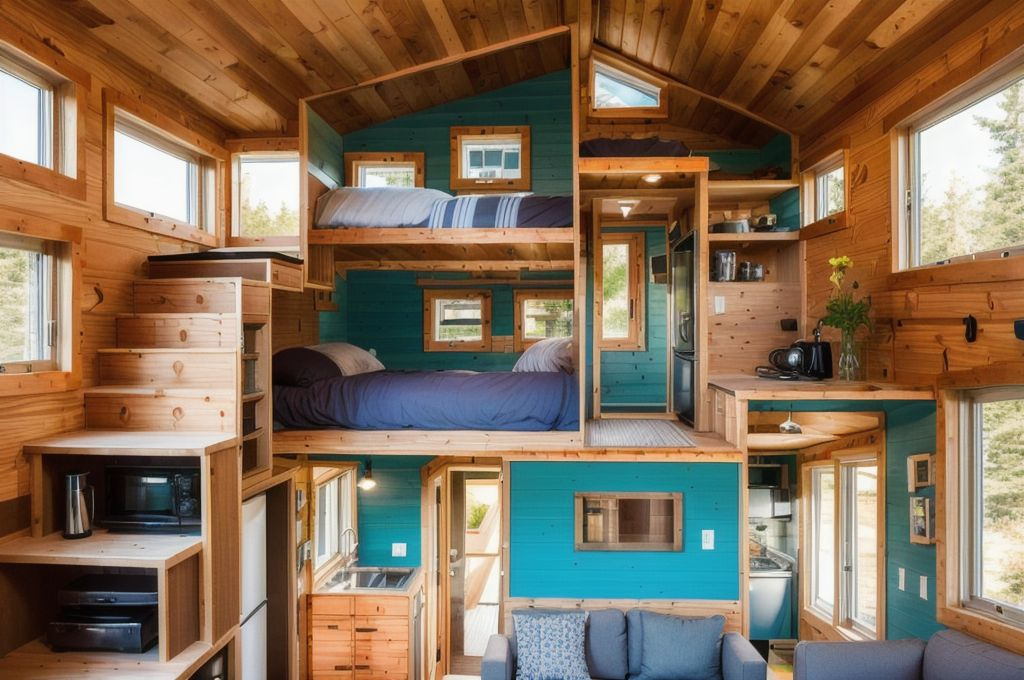Embracing Wood in Interior Design: Versatility, Sustainability, and Creativity in Tiny Houses

The article discusses the use of wood in interior design and house building, detailing its versatility, sustainability, and creative potential. It also explores the popularity and variety available in wooden houses and tiny houses.
The Importance and Advantages of Wood in Interior Design
As we delve into the impact of different elements in interior design, it’s impossible to ignore the enchanting allure of wood. From the brisk pines of Sweden to the exotic wenge of Africa, wood in its myriad forms brings a rich charm to any space. I relate so deeply to the comfort and familiarity it exudes something that came to light in my studies at Parsons. It’s in these composite fibers that interior design for flipping houses finds its golden touch.
The Aesthetic Value of Wood
There’s a peculiar magic in the grain and knots of wooden structures, they serve as visual stories spun by Nature herself. The grain, the patina over time, the very scent of it all contribute to creating an ambiance that is truly cozy and relaxing. It’s like giving your home a warm, comforting blanket that captivates the senses.
The Versatility of Wood
From floors to ceilings, furniture to accents, wood is truly a versatile powerhouse in the reign of design. Be it a monochrome modern haven or a rustic country escape, wood effortlessly adapts to the design aesthetic at hand. The very nature of its form allows it to adapt and transform, lending credence to its bounded versatility.
Wood as a Relaxing Element
Then there’s the calmness of a wood centric design. I think back to my time studying the psychology of spatial perception and it all becomes clear. Wood, as an element, carries an intrinsic soothing quality it connects us to nature, to a sense of inherent tranquility that goes beyond simple visual appeal. It’s no mere fabric; wood is a sensory journey, cocooning you in the arms of relaxation.
The adoption of wood in design is not merely a styling choice, it’s an embrace of comfort and relaxation, a sensory celebration, and a testament of design versatility. Beyond its obvious aesthetic appeal, it acts as a soulful addition to any space, adding a sense of harmony that few other materials can afford.

Diversity of Wooden Houses and Interiors
Delving into the realm of wooden houses, there’s a beautiful diversity that resonates. From the aesthetics to the narratives they can converse, the vast spectrum teeters between minimalist modern designs and spacious old styles. Wood, in all of its organic grandeur, breathes life into spaces. The array is a testament to the beautiful malleability this natural resource has in enhancing a space’s architecture and interior design flipping houses.
Different Design Aesthetics
Retaining an innate appeal, wood has the prowess to translate into diverse design aesthetics. Playing a pivotal role in my design praxis, wooden accents have a way of negotiating between simplicity and grandeur. In minimalist designs, wood connotes subtlety, warm tones, and a sense of grounding. Conversely, for larger, more opulent layouts, wood can imbue a space with an enduring luxury that resists the passage of time.
Combining Wood with other Materials
Not to be confined in its utility, the design realm often witnesses wood paired with other materials. A favorite of mine is the fusion of wood with glass, for its ethereal and contemporary echoes. The balance between the raw, earthy emotions of wood and the slick aesthetics of glass can birth spaces that are arrestingly beautiful and functional.
Influence of Cultural and Regional Styles
My personal journey in interior design has exposed me to wooden houses and interiors across different cultures and regions. The traditional woods used in Chinese architecture, the serene simplicity of Japanese designs to the remarkable utilization of wood in Malaysian houses, these stylings vividly represent cultural and regional nuances. Understanding and integrating these influences allow us to craft diverse, meaningful spaces that elevate not just the aesthetics, but also the stories our homes tell.
The dimensions of wooden houses and interiors are far reaching and immensely influential, charting new directions in the dynamic landscape of interior design. With every new project, wood continues to both challenge and inspire, underlining the mantra that form and function can indeed coexist in harmonious unison.

Sustainability Aspect of Wooden Houses
Delving deeper into the subject of sustainable living, I find myself enamored by the green and cost efficient benefits of wooden houses, a crucial element when we talk about a small modern house interior design. Wood, as a building material, carries with it several unique advantages that can be categorized broadly into cost implications, environmental benefits, and weather resistance.
Cost Implications
Wood is inherently more affordable compared to other building materials. Wooden houses are distinctively cost effective, presenting less expensive alternatives for homeowners on a budget. 🏠
Environmental Benefits
Next, the ecological footprint. Unlike most of its counterparts, wood contributes positively towards our environment by reducing our carbon footprint. It’s a renewable resource, and its extraction and processing use much less energy as compared to other materials. 🌳
Weather-resistance
Wood is more than just visually appealing. Certain types of wood are capable of standing strong amidst extreme weather conditions, bringing a unique blend of resilience and elegance to small modern house interior design. 🌨
The beauty of using wood in our homes extends beyond aesthetics; it contributes to tangible benefits – cost, environment, and resilience– making it a champion in sustainable living. Wooden houses embody the celebration of nature and, at the same time, promise a captivating journey into the realm of sustainability.

Popular and Notable Wooden Tiny Houses
Tiny houses, oh the allure! The charm they emanate is quite magical, don’t you agree?
Accessibility and Variety of Tiny Houses
These quaint abodes offer a world of possibility. Do you know the best part? They are as diverse as the people who inhabit them. You can find tiny wooden houses in an array of designs. Some serve as vacation homes, while others become downsized residences or even cozy ’granny pods.’ The choice is yours! In my small two bedroom house interior design journey, I have encountered myriad tiny houses and each one has a unique tale to tell.
Introduction to Purchasing Platforms
This may surprise you, but contemporary technology has made it easier than ever to own a tiny house. Platforms like Amazon have made it possible to purchase one directly! Suddenly, the dream of living in a tiny home is within everyone’s grasp.
Examples of Achievable Designs
Would you like a few examples to fuel your creativity? Let’s take a tour. Visualize a 28 foot long home, as elegant as a jewel, meticulously designed by Jewel Pearson. Or picture dwelling high up amongst the leaves in a beautiful tree house, the brainchild of Joni Lay in Georgia. How about a 192 square feet luxury farmhouse on wheels, courtesy of Tiny Heirloom Homes? These are some of the myriad designs achievable in the realm of tiny houses.
This journey has not merely shown me the endless variety in tiny house design, but underscored their potential as an art form in their own right. There is so much more than first meets the eye! Who knows, your dream home might be a tiny house waiting to be discovered.
Considerations in Creating Wooden Interiors for Tiny Houses
As an interior designer with a deep love for both heritage and modern aesthetics, I’ve found unique joy in the creative use of wood in tiny homes. There’s something special about shaping a small modern house interior design that’s distinctly charming. The imaginative deployment of wood elicits a sense of warmth and connection to nature, elevating the space beyond mere functionality.
The Art of Wood Usage
Timber, with its varied grains, hues and textures can be used in countless ways – from flooring to wall cladding to bespoke furniture. In the realm of interior design for flipping houses, wood can serve as a distinguishing factor, breathing life and character into an otherwise standard space.
The Essence of Layout Efficiency
Size is no barrier to style and comfort. This adage rings especially true in small two bedroom house interior design, where layout efficiency holds paramount importance. Be it a tiny home or a sprawling mansion, the skillful use of space always makes a difference. Remember, a clever layout can make a small home feel spacious and a grand one seem cozy and inviting.
The Virtue of Resourcefulness
Intelligent resource use is a critical aspect of design, particularly in compact spaces. Each element plays a dual role, contributing to the aesthetic appeal and practical efficiency. Whether it’s a hidden storage solution or a multi functional furniture piece, every bit of ingenuity counts. Remember, stylish living doesn’t need to be extravagant.
So, when it comes to interior design flipping houses or crafting the vision for your personal sanctuary, remember to harness the raw beauty of timber. Embrace efficient layouts and practice smart utilization of resources. In the dance between form and function, every step leads to a home that is uniquely and beautifully yours.
- Unlocking the Intricacies of Interior Design: Ranch-Style Homes and the Pursuit of Functionality
- Blending Tradition and Modernity: Exploring the Design of Nipa Hut and Trynagoal Tea House
- Enhancing Dining Experiences through Creative Interior Design and Rebranding in Burger Restaurants
- Mastering Home Renovation: The Crucial Roles of an Interior Designer and Effective Budget Management
- Understanding the Value of Interior Designers: Roles, Benefits, and Selection Process
- Exploring the Richness of Turkish Architecture and Interior Design through Adobe Stock and Pinterest
- Unveiling the Unique Characteristics and Design Elements of Ranch-Style Houses
- Embracing Openness and Personal Touch: The California Ranch House Interior Design Concept
- Embracing Warm Minimalism: The Rise of Brown Tones in Interior Design
- Enhancing Your New Home: Key Elements and Strategies in Interior Design
- Unveiling the Art of Luxury Interior Design: Exploration of Materials, Individual Style and Inspiration from Pinterest
- 13 Easy and Affordable Tips to Spruce Up Your Home Decor
- Exploring the Rich History and Distinctive Features of Tudor Architecture
- Exploring British Home Interiors: From Historical Evolution to Modern Adaptation
- Traversing the World of Interior Design: From Designer Profiles to DIY Ideas and Future-ready Furniture
- Contemporary Home Refinement: Leveraging Exposed Brick Design and Affordable, High-Quality Furnishings
- Exploring the Warmth and Charm of Modern Rustic Interior Design
- Enhancing Duplex and Triplex Interiors: An In-Depth Guide to Style, Lighting, and Effective Use of Space
- Creating Your Dream Bathroom: A Comprehensive Guide to Designs, Functionality, and Material Selection
- Creating Your Personal Spa: Insights into Modern Bathroom Design Trends



